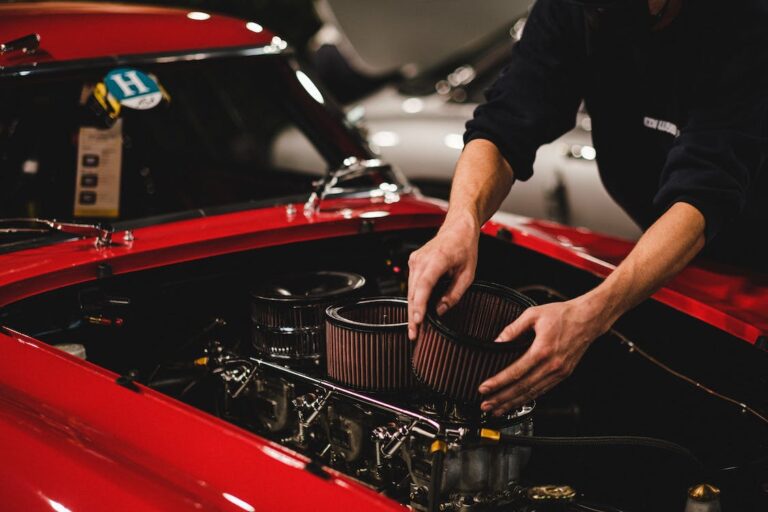As you cruise down the open road, your car’s engine works tirelessly to power your journey. Amidst this mechanical symphony, a group of unsung heroes plays a critical role in ensuring your vehicle’s optimal performance and longevity – quality filters. From the air you breathe to the oil that lubricates your engine, and even the fuel that propels you forward, filters silently shield your car’s vital components from the perils of contamination. Let’s delve into the significance of these unsung protectors: air filters, oil filters, and fuel filters.
What is a car’s air filter?
Imagine your car’s engine as a powerful lung that inhales air to create energy. An air filter stands guard at the engine’s entrance, blocking harmful particles like dust, pollen, and debris from infiltrating its inner sanctum. By ensuring only clean, oxygen-rich air reaches the engine, air filters play a pivotal role in maintaining its health and performance.
Benefits of using quality air filters
Using high-quality air filters is like giving your engine a breath of fresh air. These filters enhance engine performance, improve fuel efficiency, and extend its lifespan. Clean air filters prevent premature wear and tear and even boost horsepower. Studies reveal that a clogged air filter can decrease acceleration by up to 10%, emphasising the significance of this small yet impactful component.
You can find the correct air filter for your car by entering your vehicle’s registration into the APD website.
What do oil filters do in a car?
Oil filters are an incredibly important part of your car’s lubrication system. As engine oil circulates to reduce friction and heat, oil filters trap contaminants, preventing them from compromising the oil’s effectiveness. Without proper filtration, these contaminants could lead to engine wear, reduced efficiency, and potentially catastrophic damage.
Benefits of using quality oil filters
By using quality oil filters, you’re giving your engine the gift of longevity. These filters ensure that your engine receives clean and adequately lubricated oil, promoting smoother operation and preventing costly repairs down the road.
You can find the correct oil filter for your vehicle here.
What is a fuel filter?
Fuel filters serve as guardians for your car’s fuel system. They shield the engine and fuel injectors from impurities present in the fuel, ensuring that only clean, filtered fuel enters the combustion chamber. The potential consequences of using an ineffective fuel filter include; fuel system clogs, reduced fuel efficiency, engine misfires, increased wear and tear, and potential engine damage. It is extremely important to ensure that this is replaced when faulty or not working at its optimum.
Benefits of using quality fuel filters
High-quality fuel filters not only optimize your engine’s performance but also safeguard against potential fuel system clogs and misfires. With clean fuel, your engine can operate efficiently and unleash its true potential.
Find the correct fuel filter for your car on our website.
Maintenance and Replacement of Your Car’s Filters
Regular filter maintenance is essential for your car’s health. Inspect and replace filters as recommended by your vehicle’s manufacturer to avoid performance issues and costly repairs. Look out for signs of wear or clogging, such as reduced efficiency or unusual noises.
How to replace or change your air filter
Replacing your air filter is a straightforward process. Check your car’s manual for guidance and follow these steps for a DIY replacement:
- Open the hood and locate the air filter housing. This will be shown in your vehicle’s handbook or manual.
- Open the housing and remove the old filter.
- Clean the housing and install the new filter.
- Close the housing and secure it in place.
How to replace or change your oil filter
Changing your oil filter is crucial during oil changes. Here’s a step-by-step guide:
- Drain the old oil from the engine.
- Locate the oil filter and remove it using an oil filter wrench.
- Apply a thin layer of new oil to the gasket of the new oil filter.
- Screw in the new filter by hand until snug.
- Refill the engine with fresh oil.
How to replace or change your fuel filter
While fuel filter replacement can be more complex, it’s important for your engine’s health. Here’s an overview:
- Locate the fuel filter (it might be in the fuel tank, engine bay, or along the fuel lines).
- Relieve fuel pressure by disconnecting the fuel pump fuse and starting the engine until it stalls.
- Disconnect the fuel lines from the filter and remove it.
- Install the new filter and reconnect the fuel lines.
The Cost-Effectiveness of Quality Filters
Investing in high-quality filters can save you money in the long run. By promoting efficient engine performance and preventing damage, these filters reduce the likelihood of costly repairs and extend your car’s lifespan. While low-quality filters may be cheaper upfront, their potential consequences can far outweigh the initial savings.
As an example, a paper fuel filter could be as cheap as £10, or you could invest in an OE-quality alternative for £15-£25. This can save you money on fuel efficiency as well as the filter itself having an increased lifespan.
Environmental Impact of Filters
Using quality filters doesn’t just benefit your car – it benefits the environment too. These filters play a vital role in reducing emissions and pollution by preventing contaminants from entering the engine. By choosing quality filters, you’re making a conscious choice to reduce your vehicle’s carbon footprint and contribute to a cleaner planet.
Buying new filters for your car
The importance of quality filters cannot be overstated. Regular maintenance and investing in reputable filter brands such as Mahle or Bosch to ensure your car operates at its best. Don’t compromise on your car’s health – explore a selection of quality filters today and make a choice that resonates with both your vehicle and the environment. Your car and the planet will thank you for it.



